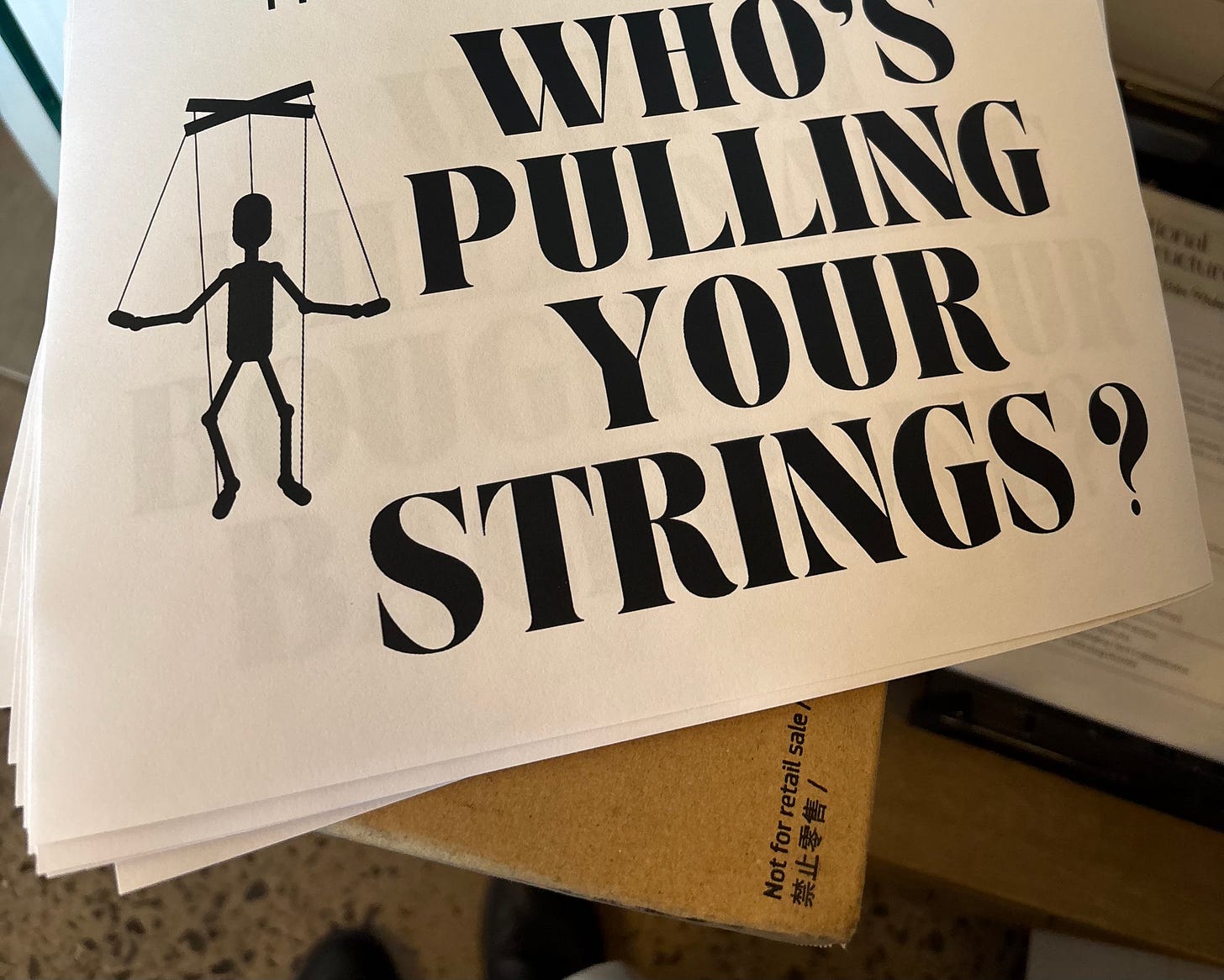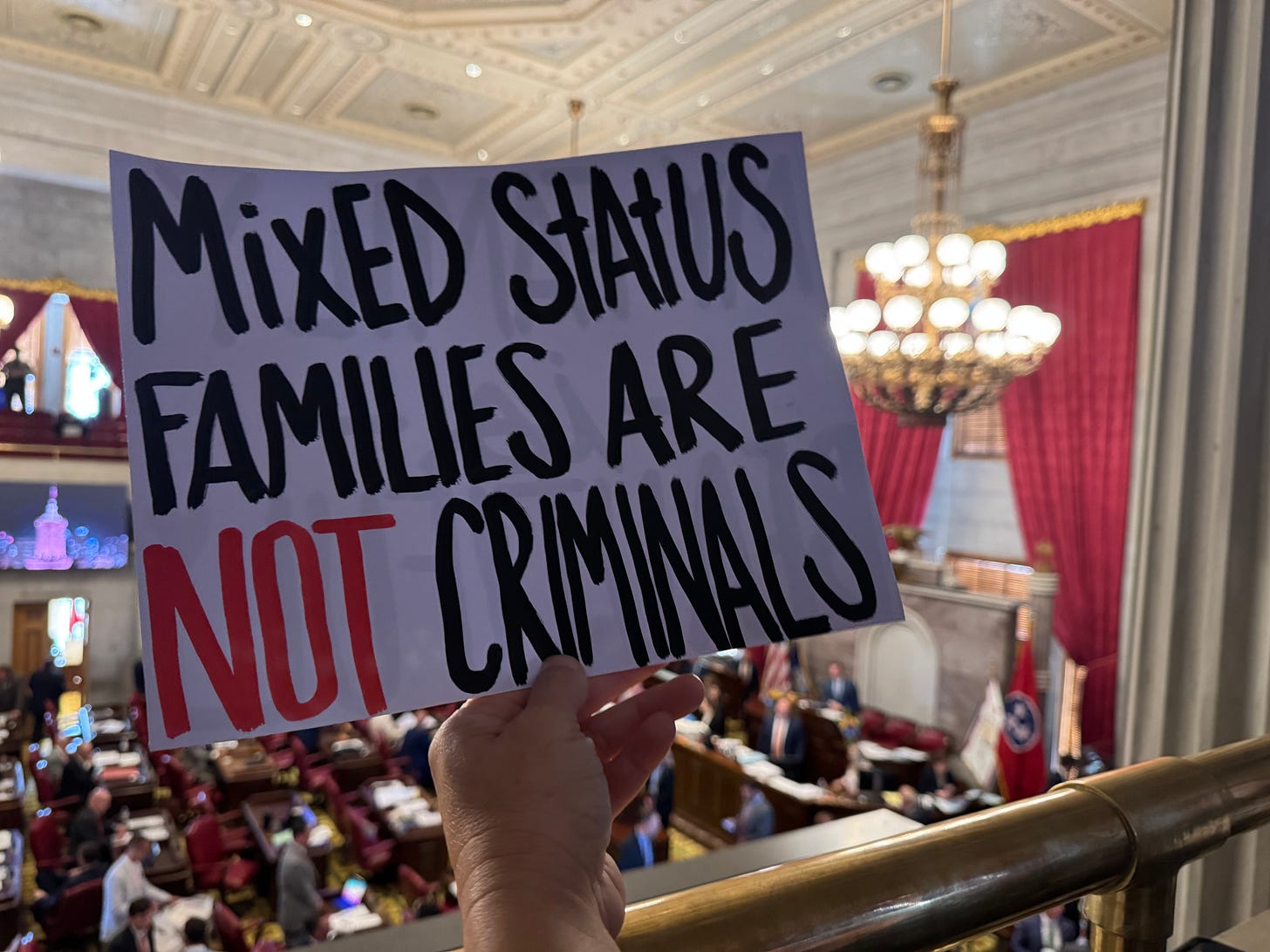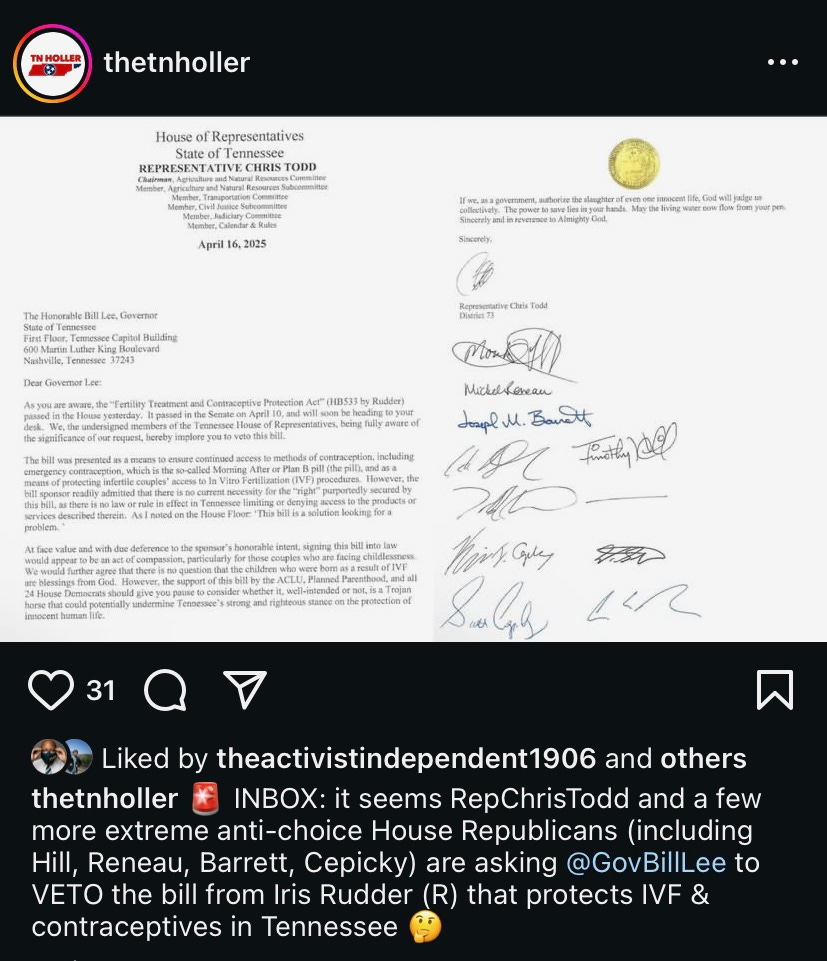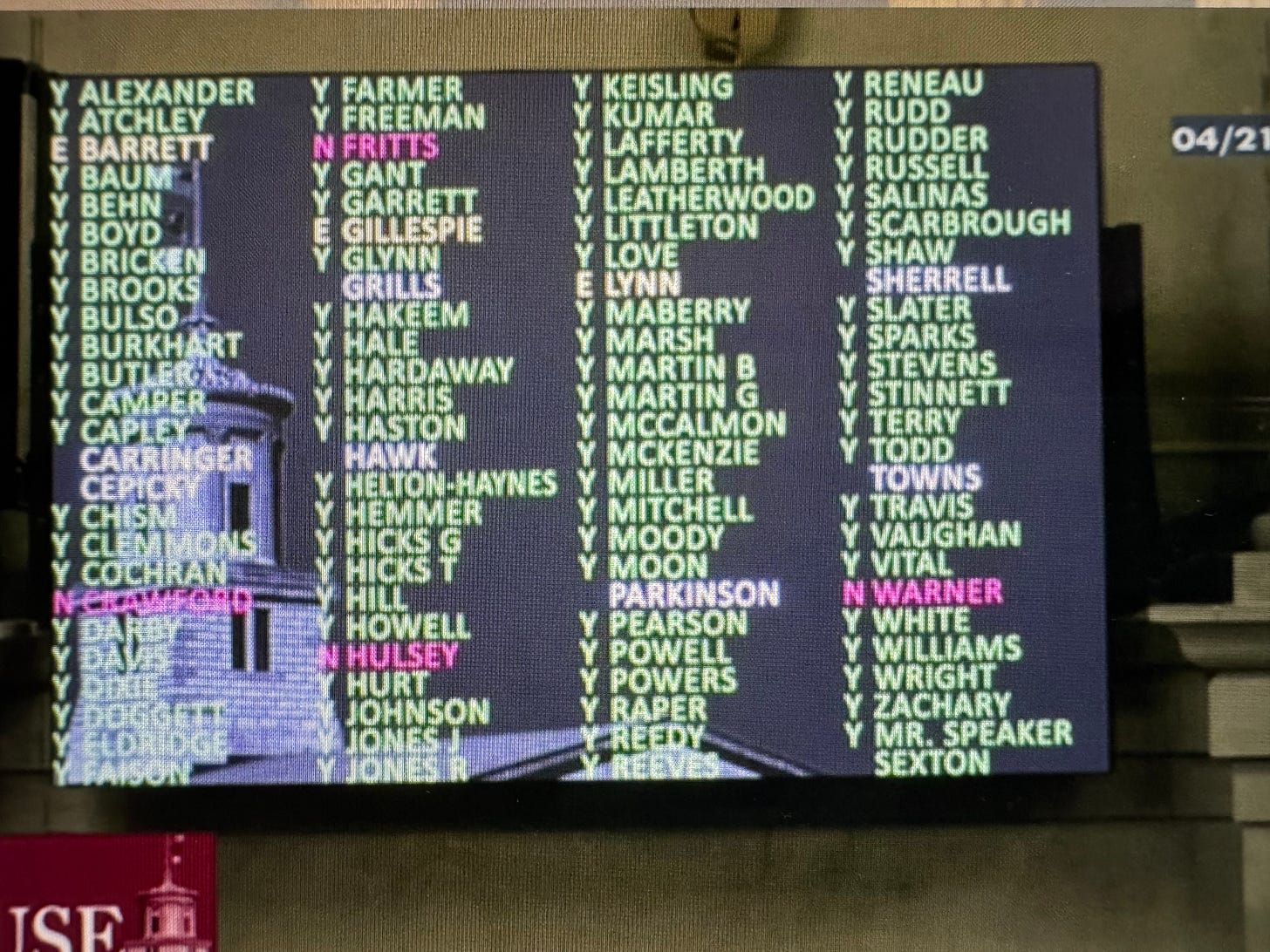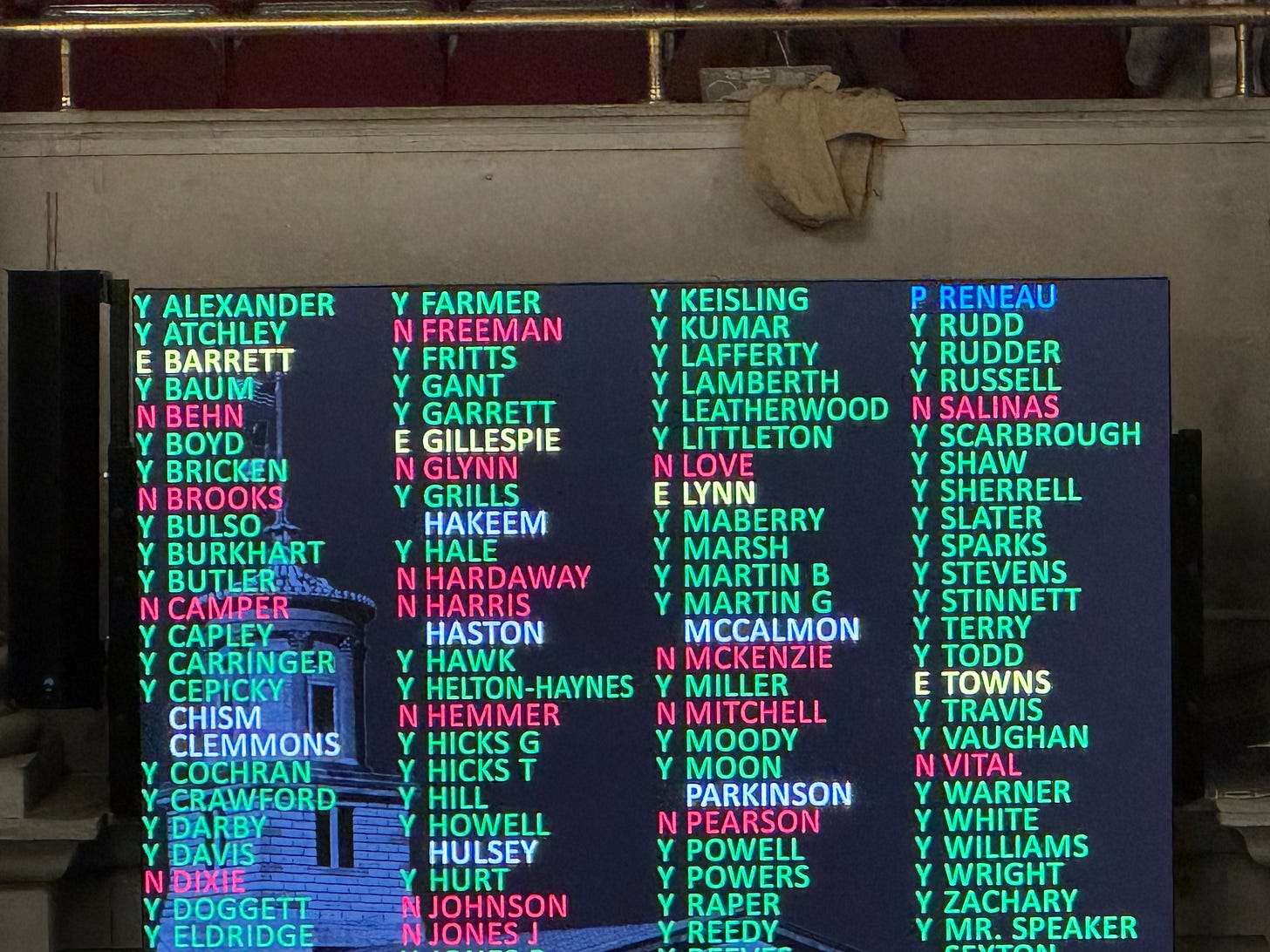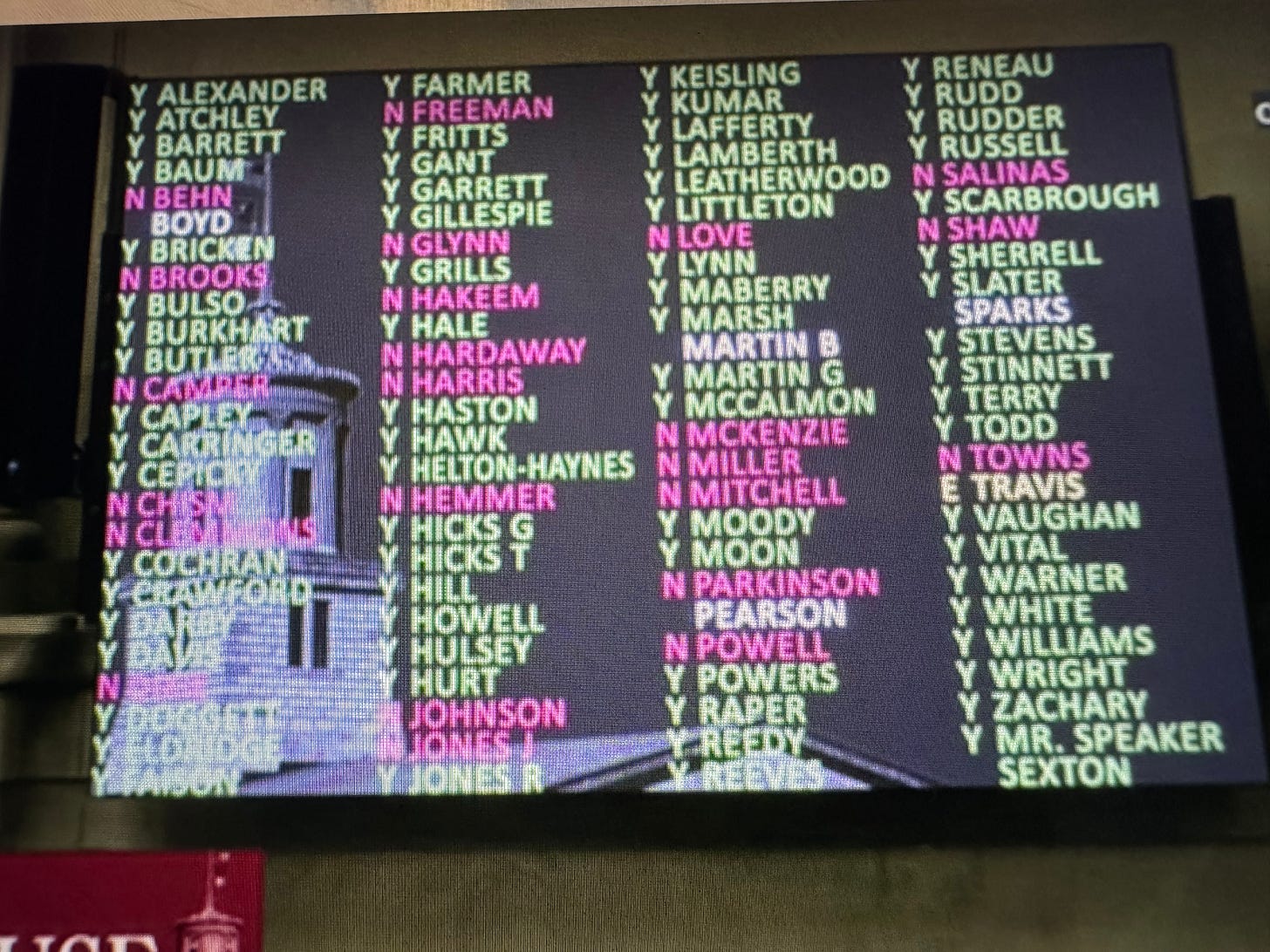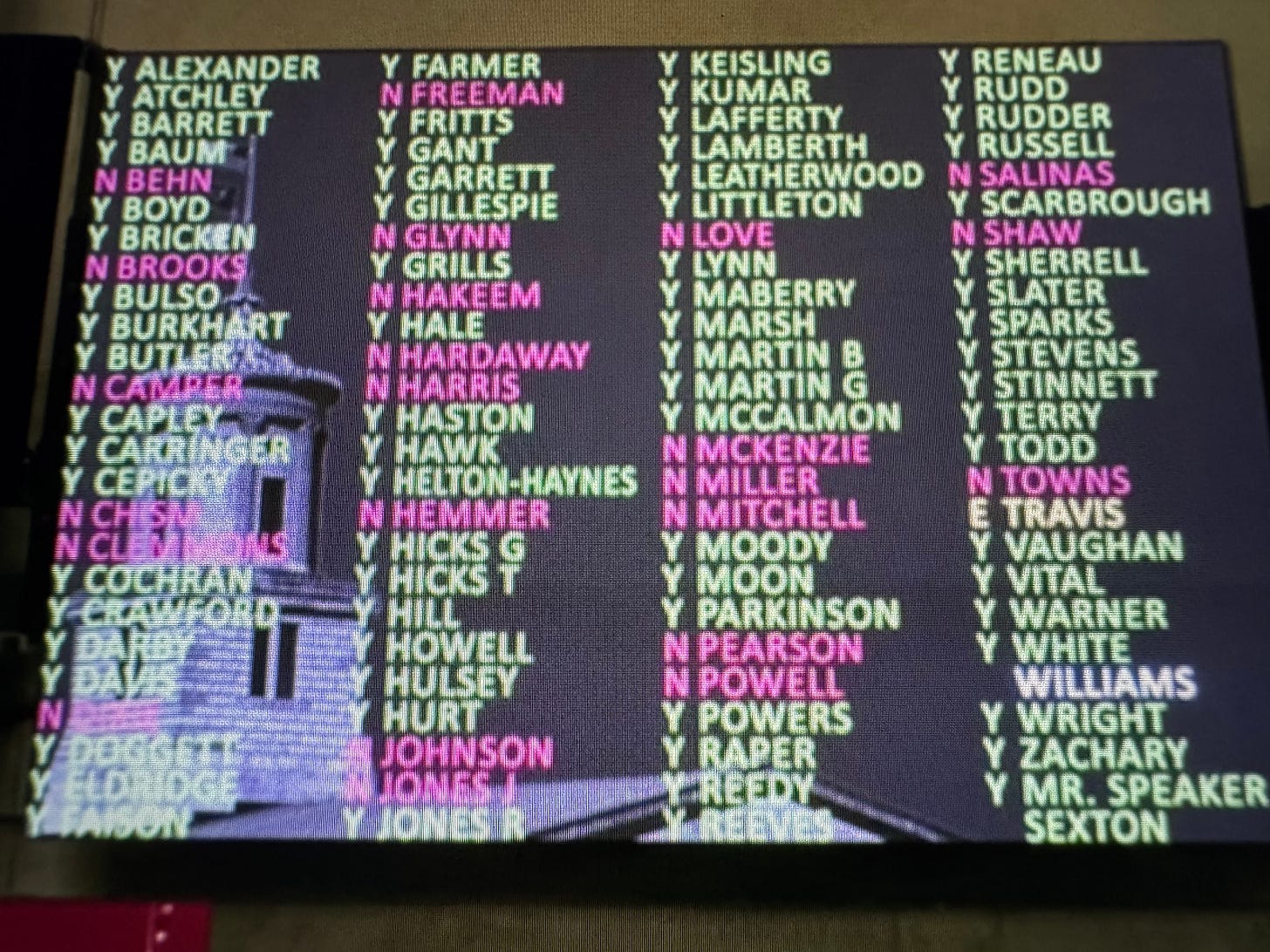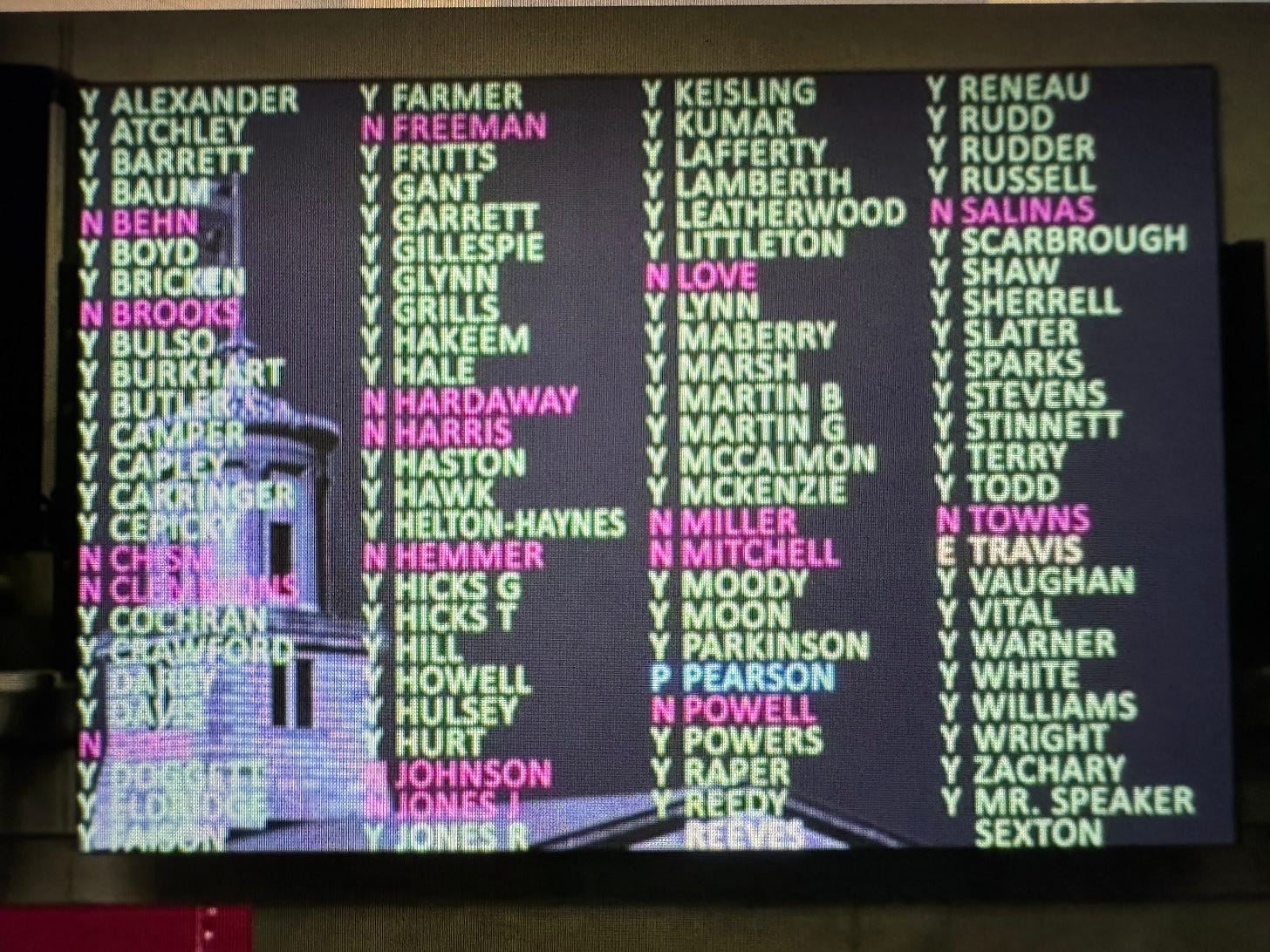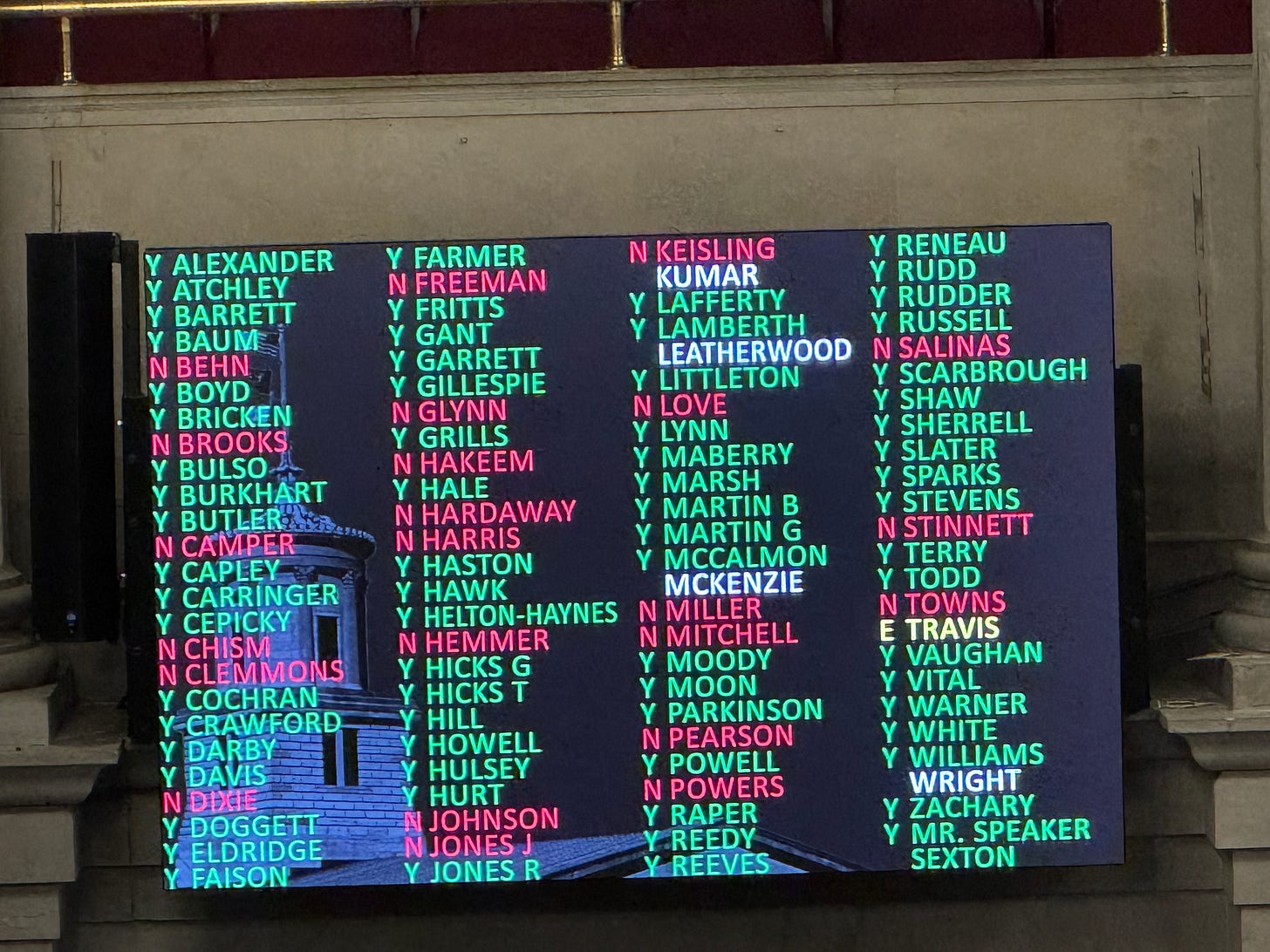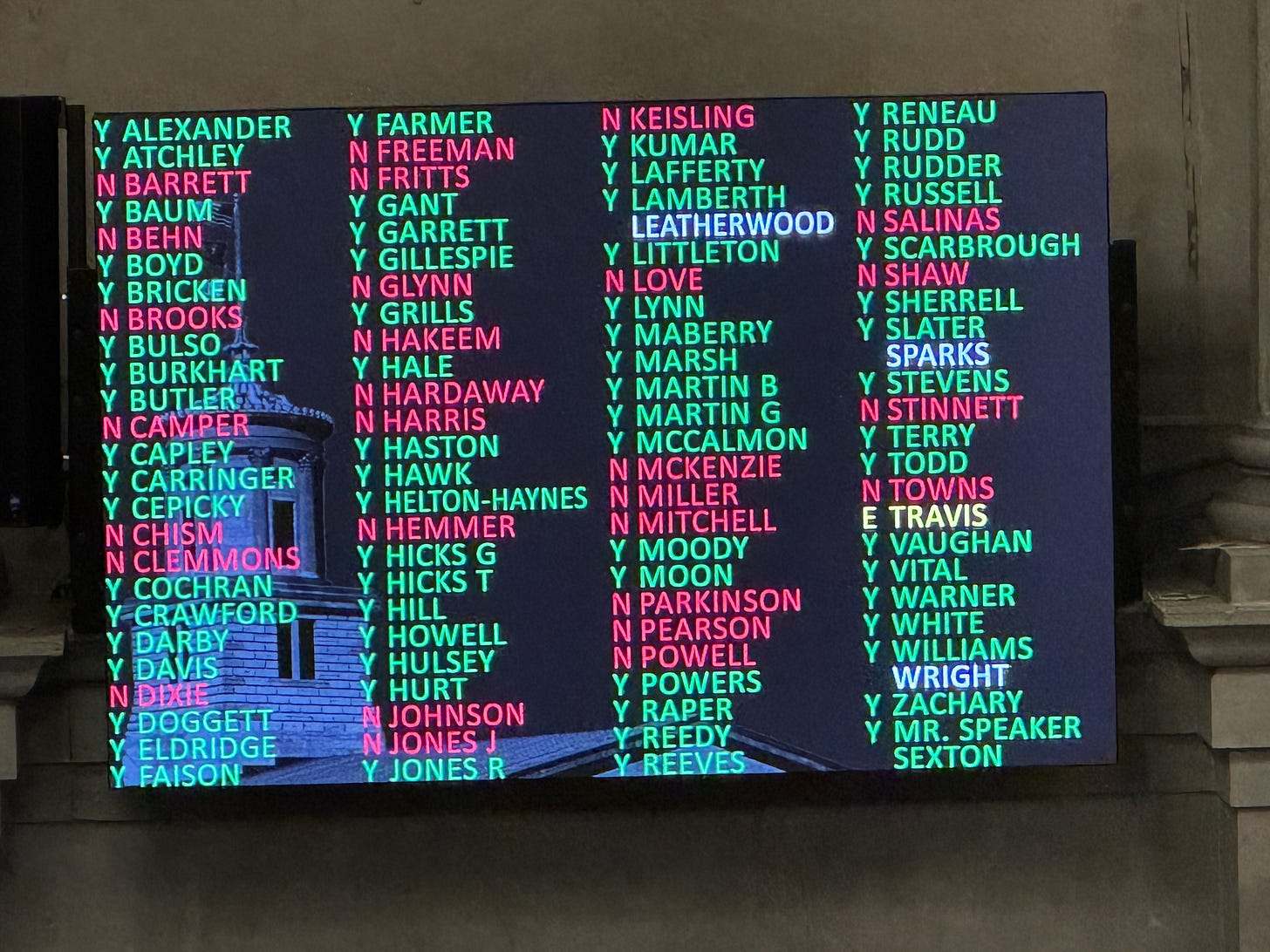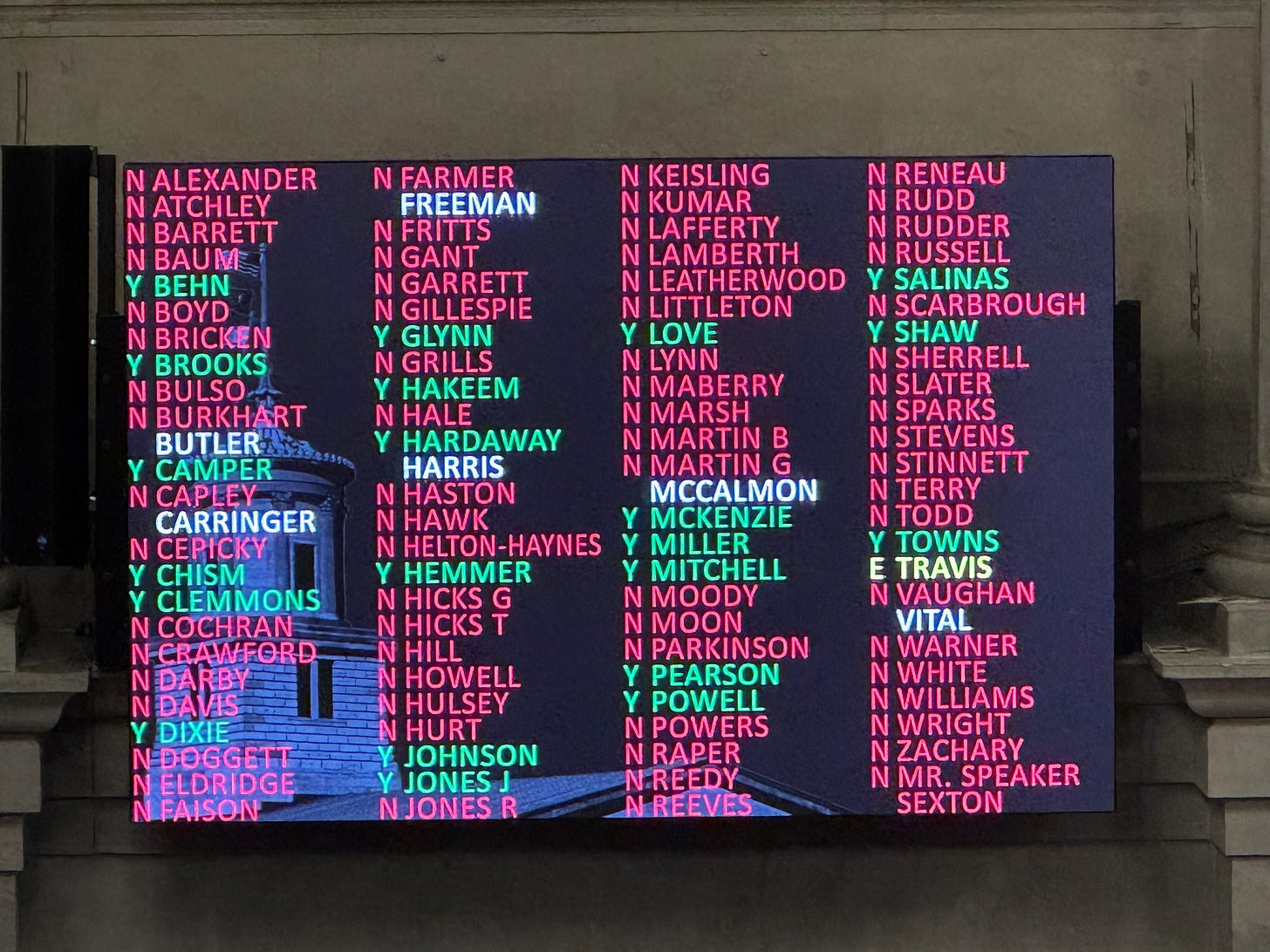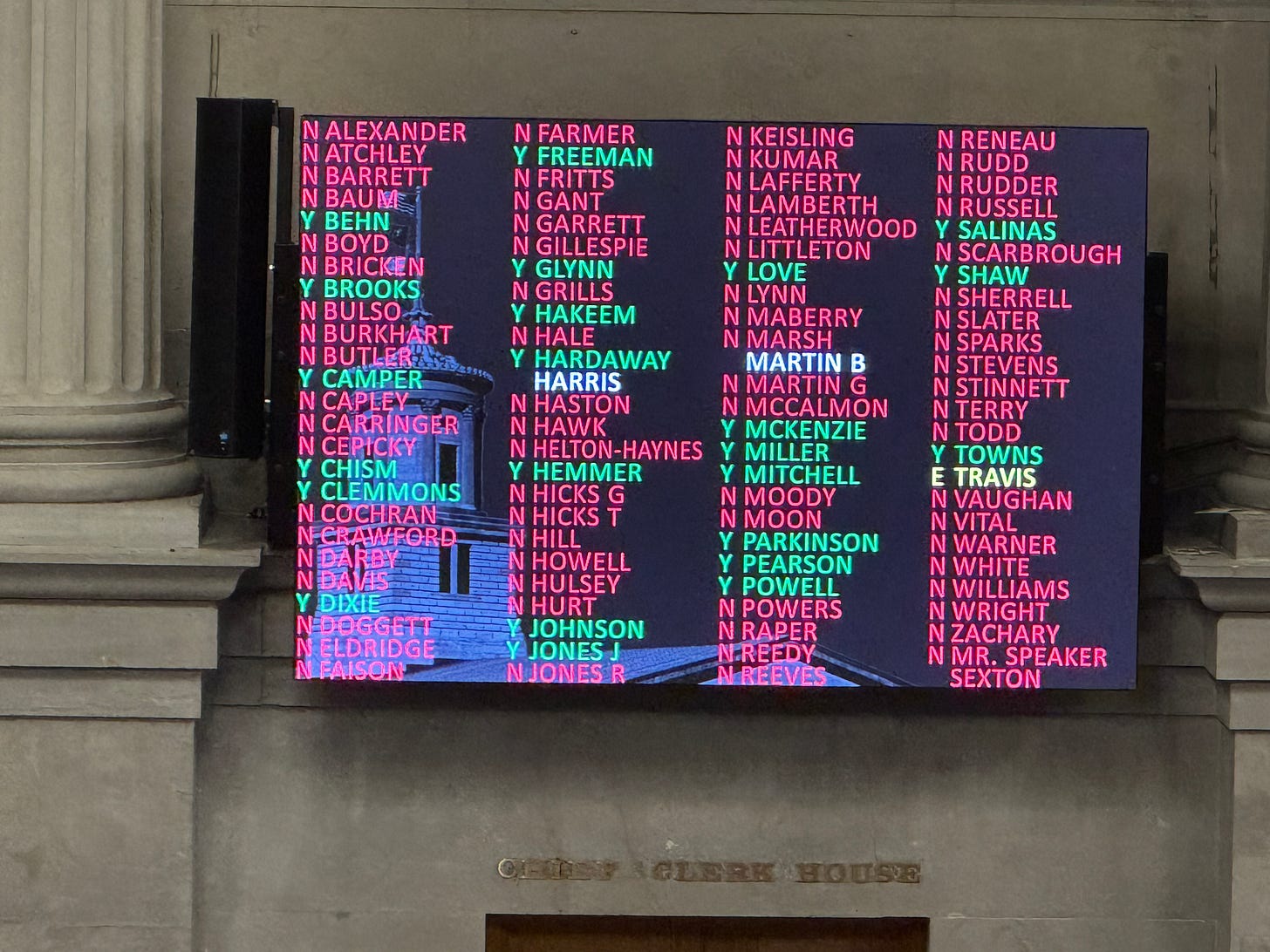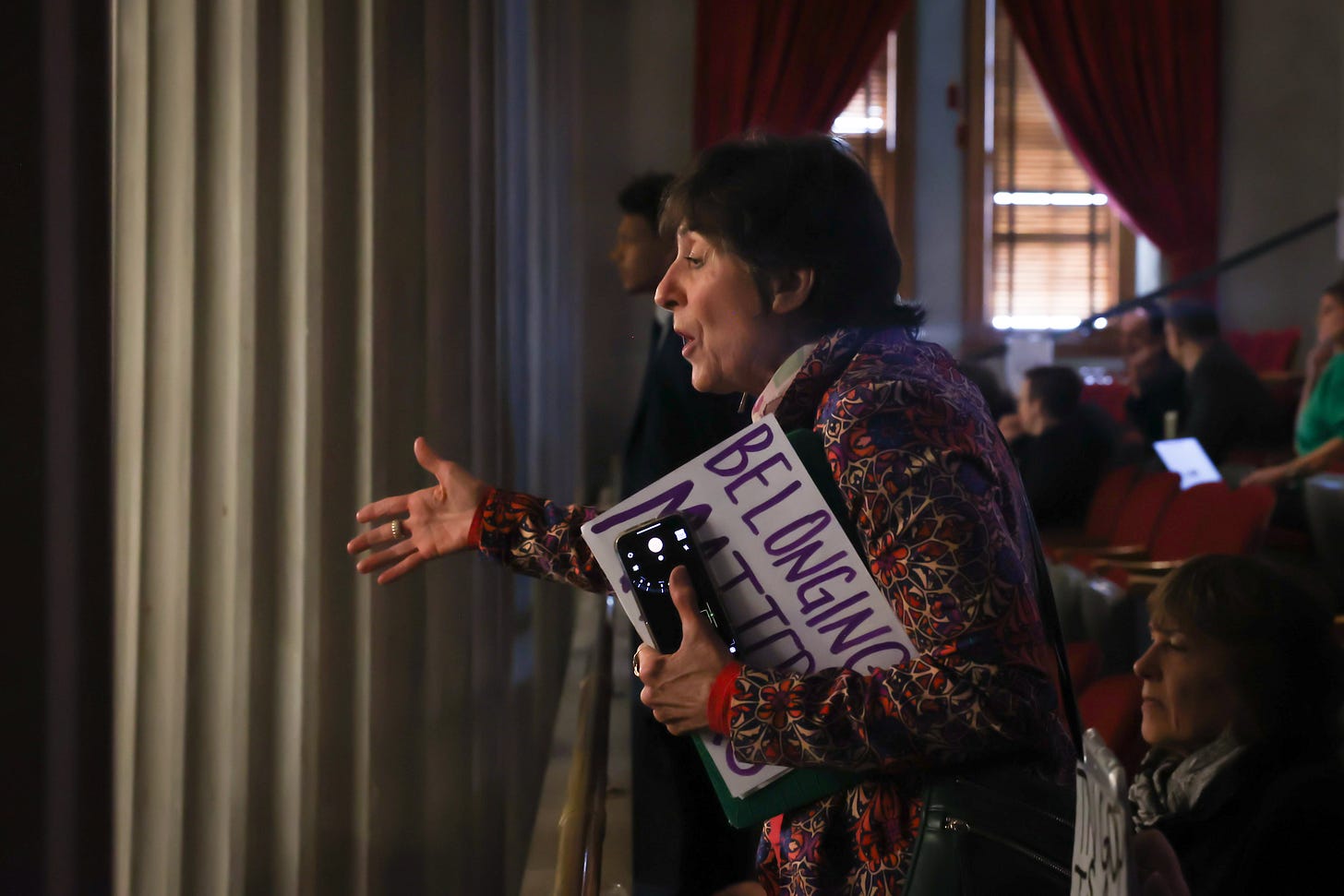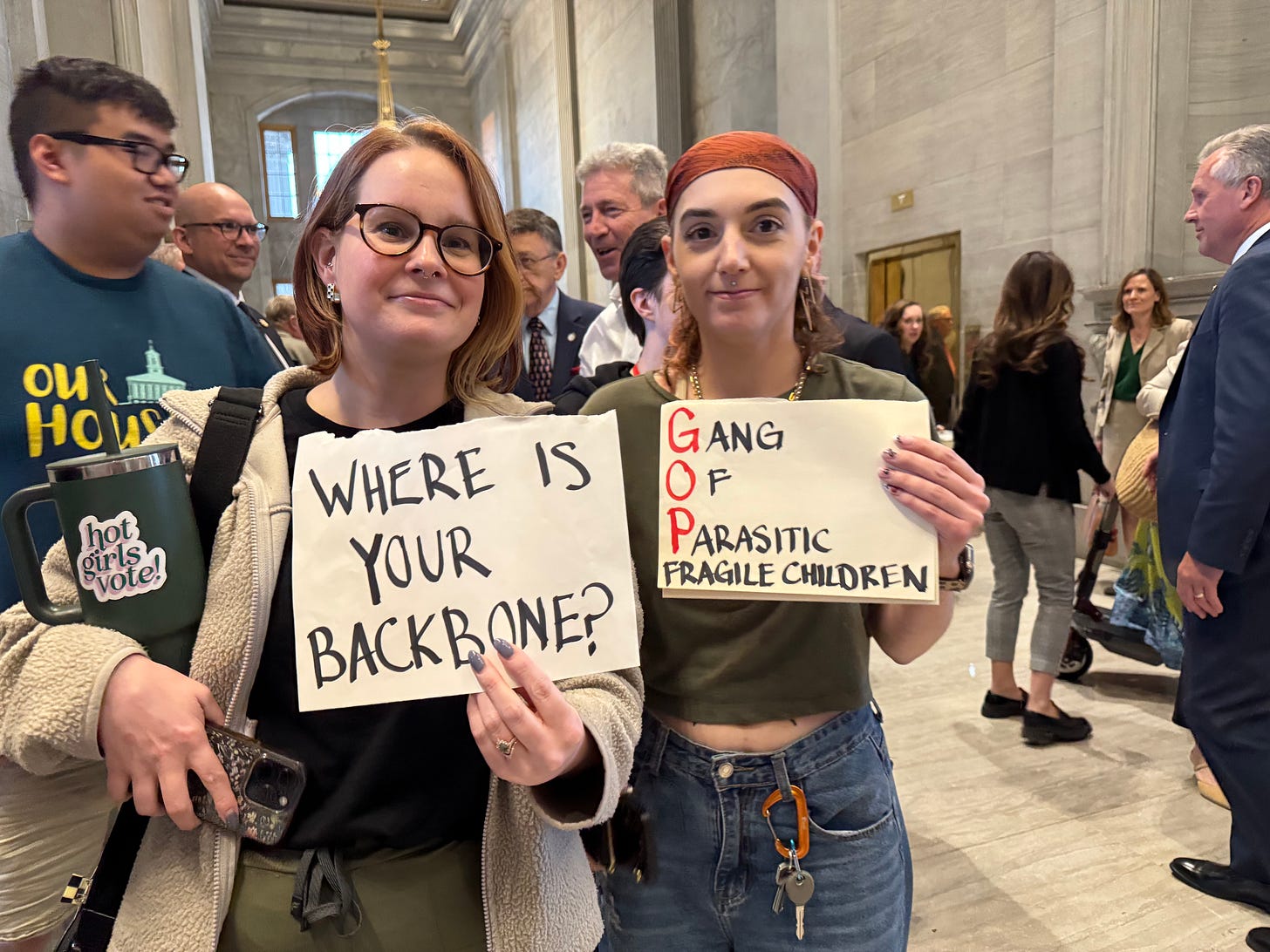Questions? Suggestions? Comments? flynnconsult@gmail.com
-Puppets and signs courtesy of “Natalie and Friends”
Friends, The 2025 Legislative Session ended with a whimper and a scream- from us- and a “We are the Champions” claim from the Republican Super-Majority Puppets. There’s residue from both in the following closing Note about the Session.
The Hartman Report featured the following song by Louise, “Papers Please,” which is a perfect reflection on the anti-immigrant bills that rolled through this year’s Legislature. The community came together to ensure that the bill requiring documentation of children attending public school DID NOT PASS (SB0836 Watson/HB0793 Lamberth). Because it was not defeated, but rather put behind the budget, it could be brought back again in 2026, during the second half of this 2-year session that begins in January.
However, the “harboring/sheltering/assisting/smuggling/trafficking” bill (HB0322 Todd/SB0392 Taylor) that penalizes non-profits and churches offering help and housing to immigrants that may be undocumented, AND also criminalizes mixed status families (US citizen married to a non-US citizen) DID PASS. (See the Tennessee Lookout article and the debate on the bill below.)
The song by Louise (Papers Please) is also fitting for the JUST-MISSED-BEING-PASSED Anti-Trans bill (SB0676 Taylor/HB0754 Faison) that would have required clinics offering transitioning care to also provide detransitioning services and collect medical data on all people seeking transition assistance. It could also be brought back next year.
The Anti-Trans bill (SB0468 Bowling/HB0571 Bulso), paradoxically called the "Women's Safety and Protection Act" because it forbids trans athletes from competing on women’s sports teams, FAILED in the Senate for this year. It was pushed back to the Senate Judiciary Committee because Bulso, the House Sponsor, would not compromise with the Senate bill as amended.
At the end of Tuesday’s Session, the Republicans pulled the second anti-DEI bill (SB1084 Johnson/HB0923 Maberry) from behind the budget. After listening to the debate, I was left wondering (yet again): how can a roomful of predominantly white people (mostly men) sit in a room with their African American colleagues (or so they call them to their faces) and listen to their impassioned speeches about how this bill would negatively impact them and others from their communities, AND STILL PASS IT?
Many of the same voices can be heard challenging the Memphis School System takeover bill pushed by House member White (HB0662 White/SB0714 Taylor). He ended up pulling the bill because he could not convince the Senate to accept his version, but it could be brought up again in 2026. Even if you are not from Memphis, this debate is worth listening to because it portends the privatization of public schools via charters and vouchers that we’ve been worried about. (See the Tennessee Lookout article.)
Sexton is receiving credit for the passage of anti-gun legislation (HB1093 Sexton/SB1075), which combined last years glock-switch bill introduced by Pearson- turning handguns into machine guns- with a few other gun-safety bills introduced by Democrats last year and this year, and quietly pushed it through the session under a Caption Bill so his pro-gun constituents would not be aware of what was being proposed. Could this change of heart be related to his reported run for a Senate seat during the mid-term elections next year? Cynical? Me?
Ironically, Bulso also put forward a resolution that PASSED (HJR0689) honoring Pope Francis, who died this week. Earlier this year, he sponsored a bill to honor the life of Father Stobel, founder of Room in the Inn. Both of these men, one Pope and one Priest, lived a humble life dedicated to being a daily example of the teachings of Jesus. Unfortunately, much of Bulso’s legislative initiatives have been antithetical to their lives of accepting people for who they are, doing no harm, and acting out of compassion and understanding for all sentient beings.
Another honoring oddity was Sexton’s bill (HJR0486) to recognize Elon Musk and SpaceX. Go figure...
Under the guise of, “If you’re a Republican who doesn't like a bill passed by your party in collaboration with Democrats, just ask the Governor to overturn it,” some of them sent the following letter to Lee after the passage of the “Fertility Treatment and Contraceptive Protection Act”, (HB0533 Rudder/SB0499 Massey). Their fears are correct- this bill will make it harder for Legislators to limit access to IVF and contraceptive care going forward. Thankfully, Lee ignored them and signed the bill.
(Special thanks to Justin Kanew and The Tennessee Holler for always giving us succinct, accurate, timely, and slightly sarcastic coverage of Legislators’ actions.)
During Tuesday’s House Floor Session, Brooks asked for a moment of silence to mark the anniversary of her son’s death, Akilah Dasilva, who was killed in the Waffle House shooting in 2018, which spurred her run for a House seat to pass gun control legislation in Tennessee. The bill Brooks crafted in his honor, Akilah’s Law, was pulled by Brooks and her Senate Co-sponsor Akbari, but hopefully it will be brought back in 2026.
It is fitting that on May 3rd, anyone can safely and anonymously rid themselves of the firearms in their possession with no questions asked. Glencliff United Methodist Church is working with its skilled partners and donors to melt down the surrendered guns into metal objects for everyday use (see flyer below).
May Isaiah 2:4 become a reality- They will hammer their swords into plowshares and their spears into pruning hooks. Nation will no longer fight against nation, nor train for war anymore.
Please take time over the upcoming weeks to thank those Legislators who’ve stood up for us, day after day, during this Legislative session. You can find contact information for your Legislator HERE.
I hope you will take a moment to scroll to the end of this Note and enjoy "I Hope," a song recorded by Meah Pace and The Resistance Revival Chorus.
And remember, we have to keep protecting each other, wherever we find ourselves.
In peace and gratitude- and hope, Michele
*********************************************************************************************************
MONDAY, APRIL 21st HOUSE SESSION
- -RE-REFERRED in SENATE after PASSING in HOUSE- HB0638 Carringer/ SB1389 Watson: TennCare - Prohibits a healthcare provider who participates in the TennCare or CoverKids programs from refusing to provide healthcare services to an enrollee based solely upon the enrollee’s refusal to obtain a vaccine or immunization or forego reimbursement for services.
Mitchell began by saying, “This bill endangers people’s lives.” In the past, all children receiving TNCARE were required to be vaccinated, making Tennessee “the number one state in the nation in childhood vaccinations.” But now we rank “48th, and are trying to get to the bottom.” In 1999, measles was considered eradicated in the US, but now the number of cases is growing. This bill “is going to cause harm to some children in this state, but we can stop it.” He asked the body to use their common sense “for a change” and “let’s stop stuff like this.”
Salinas said, “We’re playing with fire” because “herd immunity” is being destroyed as the number of children without vaccinations is increasing. “It makes our doctors’ offices unsafe for kids seeking treatment.” She also challenged the Sponsor’s comment that diseases are being brought to the US by immigrants. “The uptake for vaccines in other countries is better than here,” and the US is increasing the spread of disease by “passing senseless laws like this.”
Salinas continued, “If you care so much about this, I wish you’d support Medicaid expansion.” She pointed out that House members should not want healthy kids “picking up infectious diseases from kids that have not received vaccines…Kids are the most vulnerable among us, and it’s irresponsible to support” this bill.
After Hardaway asked whether the bill provides an “out” for providers working with transplant patients, similar to the one offered to health care providers serving cancer patients, Carringer asked to roll the bill 25 spaces because of “confusion on this.”
Although the House voted on 4/21 to pass the bill (66-23-3), on 4/22 the Senate (wisely) decided to re-refer it to the Senate Calendar Committee, killing it for this session.
++PASSED HOUSE & SENATE- HB0296 Love/SB0231 Akbari: The original bill was amended to allow a study to be conducted by TACIR to assess the impact of health benefit plans providing coverage for habilitative and rehabilitative speech therapy services, both in person and via telehealth.
Love shared with the House members his speech challenges as a youth and noted that even today, when he addresses this body or gives sermons to his congregation, he speaks slowly to compensate for it.
The bill passed the House, 85-4 (NOTE: I was left wondering what objection the 4 Republicans who voted NO and the 7 others- including 2 Democrats- who did not cast a vote could have to conducting a study to explore TNCARE coverage for children with speech challenges, especially after Love’s explanation). The bill previously passed the Senate on 3/24 with a vote of 32-0.
?? PASSED HOUSE & SENATE- HB1093 Sexton/SB1075 Johnson: Increases the waiting period, from 10 to 15 days, to send a written notice of a hearing about the suspension or revocation of a person’s handgun carry permit. (NOTE: This bill was amended to add the banning of glock-switches (turning guns into machine guns), increase the length of incarceration for persons using a glock-switch/machine gun in the commission of a crime, including from within a motor vehicle, and possession of ammunition for these guns by those convicted of a felony. The bill provides an exception for acquiring or possessing this weapon by someone “in full compliance with the National Firearms Act.”)
Pearson pointed out to the Sponsor, House Speaker Sexton, that he had brought a bill to ban Glock switches during the previous session, but the House voted it down. While Pearson agreed with the intent of the bill, he believes increased penalties and incarceration will not solve the problem of gun violence. Instead, “We need to do more to empower the people we care about and who we represent to be able to live and not suffer consistently and continually from this epidemic. We need more legislation for more flag-laws, more legislation for banning people’s access to military grade weapons in our communities, and we need to be sure we do more in this epidemic than we have thus far.”
The House passed the bill, 67-12-8. On the following day, 4/22, the Senate passed the amended version of the House bill, 23-8.
--PASSED HOUSE & SENATE- HB0055 Lamberth/SB0030 Pody: The so-called “PEACE ACT” creates a new misdemeanor offense of refusing to give your name or providing a false name to a law enforcement officer who has lawfully detained or arrested you and requested this information. (NOTE: This bill was amended to include the requirement that a person is videotaping a police-citizen interaction must stand 25 feet away from the officer. Mayor Freddie McConnell of Nashville worked WITH Lamberth to pass this legislation, leaving many advocates to wonder (once again) what the Mayor stands for.)
Behn offered an Amendment to redact the HALO provision in the bill to “ensure that press and citizens could use their constitutional rights during an exchange with law enforcement.” The HALO provision requires a 25-foot perimeter around police during an incident with the public. Behn also contends that this bill has nothing to do with preventing anti-semitism, as has been claimed by the Sponsor.
She further contended, “there are no provisions in the bill to protect media, medical personnel, and legal observers when they are watching police brutality,” and referred to Judges who have upheld the right of citizens to film public officials, including police. She concluded by providing the example of 2021 Pulitzer Prize winner Darnella Frazier, video-recorder of George Floyd’s murder by police, who could have been charged and jailed under this bill as written if it had been in place at that time.
Behn’s Amendment failed, 24-70.
Pearson noted that police, who are given the power to take a person’s life, “should be held to the highest standard of possible review and responsibility as we can.” Requiring accountability and recording interactions with law enforcement officers “is not anti-police.”
Because this legislation also prevents people from putting up banners on streets and highways “demanding government officials or others to do something,” Pearson called this bill an overreach, intended to silence dissent. He added it is “deeply troubling and concerning… We have the responsibility to defend and protect those rights against anyone who might be abridging them.”
Pearson concluded, “At minimum, you should be able to record….and hold them accountable.” He is concerned that this law “will be used as a bludgeon to our rights.”
Jones indicated that this law was brought in partnership with the Mayor of Nashville to address the rise of hate crimes and white nationalist groups marching in the city. Jones asked Lamberth if he takes responsibility for welcoming these hate groups to the city by the “rhetoric” he used in October 2022 when he stood with the Proud Boys outside the Capitol. Since then, Lamberth has attacked migrants and undertaken efforts to dismantle racial justice policies in the state.
Lamberth accused Jones of making these things up. Jones responded that he remembers the young boys who were terrorized on the Nashville streets by the Neo-Natzis, and even now, migrants in his district are terrorized by the rhetoric of these white nationalist groups. Jones told Lamberth, “You don’t need a law. What you need is a mirror.” He called on the media to connect the dots, from the terror that immigrants feel to the policies of the Tennessee legislative body.
“It’s wrong that the Mayor of Nashville has brought this to you, a bill that will restrict the rights of our constituents. So, shame on Mayor O’Connell, and shame on the Republican caucus. This is an attack on the free expression of all Tennesseans.”
Jones called out the names of several groups that have sent letters opposing this legislation and noted that Tennessee has been “poisoned by white supremacist violence and bigotry… coming for… people who look like me, who look like my constituents. They’re coming for the transgender Tennesseans, they’re coming for the LGBTQ Tennesseans, the undocumented Tennesseans, and they’re coming for Muslim Tennesseans.”
Lamberth railed against Jones, calling him a racist and a Democratic Socialist to the applause of the Republicans. Jones responded quickly, as his time was running out, “Calling out racism does not make you racist.”
The bill passed along party lines, with a vote of 70-20-4. Interestingly, the 4 who voted Present-but-Not-Voting are Republicans. Previously, on 4/14, the Senate passed the bill, 30-2.
--PASSED HOUSE & SENATE HB0069 Lamberth/ SB0133 Johnson: Election Laws - Requires the Coordinator of Elections to create two electronic portals to verify an applicant's eligibility to vote based upon US citizenship and conviction of a felony before registering the applicant to vote.
Clemmons expressed concern about the last election, when the state Election Commission sent a letter that caused confusion as to whether individuals who had registered were still eligible to vote.
Clemmons expressed concern that voters would be purged or unduly burdened by the additional steps proposed in the bill. “When somebody’s a citizen, they’re a citizen. If they have the right to vote, they should be able to vote.”
Pearson expressed concern about the possibility that people who are otherwise eligible to vote will be prevented from accessing the ballot. He contended that “those 13,000 letters that were sent out were intended to discourage people from exercising their right to vote.” He believes those “with immigrant-sounding names…were targeted by our own Secretary of State before the last election.”
Mitchell contended that the Coordinator of Elections did not send a letter to anybody named Smith or Jones, Lamberth or Mitchell. He maintained that the Election Commissioner “sat in a meeting and watched someone testify…commit forgery and election fraud, and the man did nothing about it. But he could send out letters to people questioning whether someone is an American citizen or not.”
Pearson commented, Tennessee is “the lowest in voter participation and engagement, and that has a lot to do with laws that need to be changed.” He suggested one way to address this is to offer automatic voter registration for those who have completed their sentence. He concluded, “You can’t hide intimidation practices intended to suppress the vote.”
The bill passed in the House, 77-18. On the same day, 4/21, it also passed in the Senate, 32-0-1.
- -PASSED HOUSE & SENATE- SJR0025 Johnson: Constitutional Amendment removing the right to bail for specific offenses. Today, bail can only be denied in cases of first-degree murder. (Note: If there is a rebellion in Tennessee, the Attorney General gets to decide who gets bail.)
Sexton maintained that this bill gives more latitude to the Judge to decide whether or not to offer bail when one of the listed crimes is committed. Pearson argued that when people are accused but not yet found guilty, they must be protected from prejudiced judges.
Dixie was concerned about the language in question #7, “for any other offense,” which is quite broad. He was also worried that bail could be denied for drug-related crimes.
The bill passed in the House, 84-10-1. On 3/26, the Senate voted to adopt the legislation, 23-6-1.
- -PASSED HOUSE & SENATE- SJR0001 Haile - Prohibits the Legislature from levying, authorizing, or otherwise permitting a state tax on property.
Because this bill would remove taxes from all real property in Tennessee, Behn wondered if it would allow a business owner to challenge what’s left of the franchise tax, because it includes “the valuation of real property.”
The bill passed the House, 70-20-4. Earlier, on 4/14, it passed the Senate, 30- 2.
++PASSED HOUSE & SENATE- HB1192 Cepicky/SB0871 Hensley: Directs TACIR to conduct a study on the continuum of care in Tennessee as compared to other states and include recommendations for how to improve it. The bill PASSED in the House, 94-0. On 3/27, it had passed in the Senate, 32-0.
--PASSED in HOUSE & SENATE- HB1144 Boyd/SB1115 Pody: Requires the Department of Corrections to post on its website the same reports about private prison operations that are provided to the General Assembly. (NOTE: The bill would also place a 10% penalty on private prisons for “bad behavior” to urge their improvement.)
Pearson believes private prisons are not a good idea because they are designed “to make a profit off the incarceration of people in our communities.” He expressed worry that the 10% penalty would merely result in prisoners remaining in local jails at a cost to the county rather than to the State. Boyd countered that the State would cover this cost.
On 4/21, the bill passed the House, 93-0. The next day, the Senate concurred with the House in a vote of 33-0.
--PASSED HOUSE & SENATE- HB0541 Vaughan/SB0670 Taylor: Water Pollution - Prohibits the Department of Environment and Conservation from applying criteria that will result in the classification of real property as a wetland, or otherwise regulating real property as a wetland, unless the property is classified as a wetland under federal law.
Pearson challenged the premise that increasing housing development should be done at the expense of “the quality of the environment, the places where we live, the places in Tennessee that are so beautiful for all the things that people do,” including hunting, fishing, and enjoying wildlife.
He noted that Shelby County recently received “the most rainfall that we've ever had due to the effects of climate change, due to the effects of the environment that we are living in being quite different than it was 5, 10, 15, 20 years ago.”
Pearson challenged this bill because it would drastically change regulations that currently protect wetlands and instead help corporate entities who would now “be able to make more profit.”
Clemmons began his comments by acknowledging the housing shortage in Tennessee, but called for balancing this issue with maintaining environmental protections. While he “respects and understands the argument for private property rights,” he identified the difference between somebody who owns a piece of property and wants to do what they want with it, “versus developers who buy spec property to build 200 houses on it.” He stated that the focus of this bill is not “protecting the private property rights of an individual's farm or family farm.” And while he respects that developers “want to buy a bunch of land and make a profit on it… We do have to find that balancing line between protecting our wetlands, protecting the environment, and addressing the housing shortages and producing more housing stock.”
Clemmons pointed to the fact that “every wetland we develop, regardless of how it's defined” becomes a bigger issue “for the state of Tennessee and existing private property owners.” If a developer paves over wetlands next to his family’s farm, it “creates a problem for me. Those are my private property rights that are being screwed over in the name of somebody else's who's looking to make a profit.”
While the deregulation outlined in the bill may sound great, “to the extent it harms existing private property owners property, and to the extent it causes more flooding, to the extent it threatens our environment even more, that's very problematic, especially if the only incentive is a bigger profit for people who are buying mass quantities of land for spec purposes.”
“I'm all for figuring out something that balances these interests, but I don't think this bill gets us there.”
On 4/21, the bill passed the House, 71-21-1. On 4/14, it passed the Senate, 26-6.
++ PASSED SENATE & HOUSE- HB0717 Jones R. /SB0654 Crowe: Enacts the "Caring for Caregivers Act," requiring the creation of a three-year family caregiver grant pilot program to provide grants to caregivers whose family members are diagnosed with Alzheimer's disease or related dementia to offset expenditures they incur. On 4/21, the bill passed the House, 94-0, and the next day it passed the Senate, 29-0.
- -HB0969 Hawk/ SB0144 Walley: Directs the Department of Transportation to study transportation infrastructure needs in the state, including costs and funding sources from 2026 through 2075, and allocates the tax revenue from selling new or used motor vehicles and tires to the state highway fund.
Clemmons challenged the body’s refusal to pass bonds to fund infrastructure projects. “We are 45 billion behind in infrastructure projects. We're never going to catch up by taking money from the general fund, 1 billion at a time, 2 billion at a time, and putting it into the state highway fund. It's just not gonna happen.”
He concluded, “Guys, road projects and all the infrastructure projects in your district are never going to happen unless we modernize the way we fund transportation infrastructure. It's as simple as that.”
When the bill Sponsor disagreed, Clemmons responded, “I appreciate that you disagree with me. But facts are facts. The money don't add up and we can be as stubborn as we want to be when it comes to pay as you go, but we will never address the transportation problems plaguing this state.” He pointed to the disater of I-24 that “will never be fixed, as long as we refuse to modernize the way we fund these projects. Toll lanes aren't gonna fix it. It's gonna exacerbate the problem.”
“We said we'd never break the seal between our bifurcated budget and start stealing money from the general fund,” but “We've got to wake up. We bond everything now, except for road infrastructure.”
On 4/21, the House passed the bill, 89-0. The next day, the Senate passed it, 33-0.
- -PASSED HOUSE & SENATE- HB1307 Lamberth/SB1273 Johnson: Extends the date, from October 1 to October 15, on which the department must file an annual report evaluating the progress of the school turnaround pilot program. (NOTE: This bill would end the 5-year TN Achievement School District program in the Memphis School District)
Parkinson spoke about the “catastrophe” that the TN Achievement School District, voted on by the Tennessee Legislature, foisted on Memphis during the past 5 years. The program was “plagued with scandals” until “$2 billion later,” this bill would end it. He described the “grand scheme” that originally projected they were “going to take the bottom 5% of schools and move them to the top 25% in five years” but instead it became “the worst education experiment ever attempted by the state of Tennessee. Every single school, with exception of maybe a few out of the 41” ended with being “worse than our lowest performing schools.”
“Madam sponsor, I venture to say that if you invested $2,000 of your own personal dollars into a scheme, after the first year, you would not invest anymore. But we invested $100 million per year since 2011 of taxpayer dollars… but not a single person in here would do that with their own money. Not a single person.”
Parkinson noted that while “I do understand that we're sun setting the Achievement School District, we're remixing it under the auspices of the charter commission.” White’s upcoming bill, (HB0662 White/SB0714 Taylor), “has the ability to convert all your schools to a charter,” so “It's not really ending. We're going to keep on and keep on and keep on until every one of your districts is converted to either chartered or voucher districts. You better believe that.”
“The goal is to privatize the entire state of Tennessee's education. They started. We were the test dummies. And guess what? It failed, and now they're going to come back to say, ‘Hey, open the floodgates.’”
The House passed the bill, 75-15-2. Previously, on 4/15, the Senate passed it, 32-0.
TUESDAY, APRIL 22nd HOUSE SESSION
Salinas opened Tuesday’s House Session with a tribute to Earth Day, quoting the words of Pope Francis: “We are called to make the earth a beautiful garden for the human family. When we destroy our forests, ravage our soil, and pollute our seas, we betray that noble calling. May the relationship between man and nature not be driven by greed, to manipulate and exploit, but may the divine harmony between beings and creation be conserved in the logic of respect and care.”
Salinas concluded, “I think it's important that as lawmakers we keep those wise words in our hearts and in our actions. Thank You.”
- -HB0322 Todd/SB0392 Taylor: Creates the offense of human smuggling, harboring, hiding, or assisting an individual whom the person knows or should have known has illegally entered or remained in the US.
Behn offered Amendment #2, which would exempt attorneys who are helping immigrants to become citizens. It failed along party lines, 25-72.
Behn then offered Amendment #3, to exempt non-profit organizations from being prosecuted by the Attorney General for providing services to immigrants who may be undocumented.
It failed 26-68 with two Republicans, R. Jones and Stinnett, joining the Democrats voting for the Amendment.
Sexton then warned those of us in the balcony that we would be removed if we continued to hiss in disgust at Todd’s comments about immigrants.
Todd used the “tragedy” of unaccompanied minors arriving and possibly being trafficked in the US as cover for passing this bill that would criminalize organizations providing support, services, and sanctuary to these children, and others seeking sanctuary and asylum in the US.
Parkinson asked if a person married to an undocumented person could be charged with “harboring” under this bill.
Parkinson then asked about an American offering shelter to their spouse who is undocumented, but Todd would not respond, saying instead, “I’m not going to surmise on a hypothetical.”
Parkinson pressed in, saying, “These are actual human lives, not hypotheticals.” He noted he was asking because the debate had been cut off in Committee before he could get his questions asked.
Todd then clarified that given the “OR” provision in the bill, such families WOULD be guilty of harboring, sheltering, and concealing their undocumented relative under this law.
Hardaway asked, “Is it necessary for a church or a nonprofit under a church's direction… to actually ascertain the citizenship or the legal status of an individual before they provide care?”
Before he could answer, a person in the gallery shouted down at Todd in anger about his bill and then left on her own accord.
Clemmons said the “Senate adopted Amendment Number Three… and we've adopted the Senate Bill.” It “creates a Class C felony for the offense of human smuggling,” which includes “intentionally harboring. Harboring is defined as providing shelter to.”
He went on, “The church which I was raised in, the church which most of you attend, or you were raised in, taught the Word of God and the teachings of Jesus Christ, to help your neighbor, to assist those who need assistance. I mean, the entire Bible is chock full, Old Testament, New Testament… help someone who needs helping. Your church does this, takes in anyone, gives them assistance, gives them food, gives them shelter. You and your church will be held liable under this bill. That simple. That's it. It's that clear.”
He finished by saying, “I continue to be amazed at how fast Christianity is thrown out the window in the name of politics. This is atrocious. I'm asking you, read the plain language of Amendment Three… and tell me that your church is okay with this. I have got churches throughout my district of multiple faiths serving the immigrant community…they're doing what the Bible teaches them to do. They are providing shelter to those in need.
If “this Attorney General comes after the churches in my district, or anybody in the entire state of Tennessee, we're going to have a problem, because there's something called freedom of religion in this country that we follow in the state of Tennessee. I would ask of you, when voting on this bill, to call on your faith, not on your political party. What's more important to you?
The vote was 71-23, strictly along party lines. On 4/16, it had passed the Senate, also along party lines, 26-6. To read the law itself, as amended by the Senate, find the Summary HERE.
- -PASSED HOUSE & SENATE -HB0958 Slater/ SB0950 Powers: Education - Changes from July 10 to July 20, the date by which a county trustee is required to report to the commissioner of education all receipts and expenditures of all elementary and all high school funds within the year ending June 30 preceding. (NOTE: This Caption Bill would operate as a “trigger law” to ensure the State is ready if/when the Department of Education is eliminated at the national level.)
By passing this bill, Powell contended, it says, “We are okay with the Department of Education being completely disbanded.” He reminded the body, “We rely on the federal government for guidance when it comes to issues like the Americans with Disability Act, and… issues like civil rights. By disbanding the Department of Education and moving away from federal support, I think we're going down a very dangerous road that is going to completely undermine education for the students in Tennessee.”
McKenzie said this bill is a “pre-emptive vote to not take federal dollars.” The task force to be formed under this bill “is going to choose winners and losers in terms of …how we're delivering K through 12 education today.”
McKenzie followed up by saying, “You're making decisions with this bill for the LEA. If the Feds don't put their funds with it… They're gonna be left to tax their local communities if they want to keep these particular programs.
“These task forces are going to be political appointments…They're not going to understand the history.”
Johnson asked the body not to pass this bill, saying instead the state should wait until it knows what will happen at the federal level with education funding, and then it can create a task force to address the expected program and funding changes.
“One of my concerns is that we're putting the cart before the horse, and we have no guidance from the federal government yet, so perhaps we should wait.”
She encouraged the body to “imagine if that money does not come to Tennessee over the next five years. We're draining a billion dollars from public schools to go to vouchers, and then we're not getting that money for special education and for Title 1 that all of our rural schools need, as well as our urban schools. This is a huge mistake. We should be telling our representatives not to do this to Tennessee.”
The final vote was 74-23, again along party lines in the House. It was passed in the Senate on 3/27 by a vote of 27-5
??HB0653 Hicks T. /SB0229 Briggs: Makes changes to campaign finance requirements, requires executive branch personnel to receive ethics training, and distributes 80% of the privilege tax collected from lobbyists to the bureau of ethics and campaign finance.
Hardaway questioned whether the bill impacts the management of money contributed to PACS and Caucuses. Hicks told him the bill “eliminates both individual and aggregate limits for political campaign contributions controlled by the political party or the caucus.” So, a Caucus will not be limited in the amount of contributions it can make to a particular member’s campaign.
When Hardaway asked whether the bill limits the contributions made INTO the PAC or Caucus, Hicks told him that the bill does not address this.
On 4/22, the bill passed the House, 73-21, and also passed the Senate, 28-3.
++ HB0675 Cochran/SB0415 Lowe: Reduces the amount of state-mandated assessments for students in grades 3-12, reduces teacher and principal evaluations for those "at expectations," and requires that rules be set to meet the 180-day requirement for classroom instruction.
Camper spoke about the importance of including student input when decisions are being made about achievement testing. Cochran agreed to include such students’ input.
The bill passed in the House 79-17-1. On 4/17, the Senate passed the bill, 29-0-1.
++PASSED HOUSE & SENATE HB0915 Sparks/ SB0322 Massey: Grants eligible employees up to six workweeks leave to care for a family member with a serious health condition. (NOTE: According to the Pew Research Center, nearly half (47%) of adults in their 40s and 50s have a parent age 65 or older and are either raising a young child or financially supporting a grown child.)
Powell shared that he helps to provide care for his Mom and Aunt while also parenting his 2 young children. Calling himself a part of the “Sandwich generation,” he noted this reality impacts a lot of Tennesseans, some of his colleagues in the Chamber, and the passage of the bill will help State employees better manage this challenge. The bill passed the House, 89-1, with only Republican Bricken voting against it. On 4/16, it had passed the Senate, 33-0.
++DEFERRED IN SENATE/ PASSED IN HOUSE - HB0940 Camper/SB0918 Campbell: Raises to 16, rather than 12, the minimum age for operating a personal watercraft without direct adult supervision and requires those operating personal watercraft to maintain insurance to cover loss or injury.
The bill passed in the House (72-15-3); however, it was DEFERRED in the Senate until 1/13/26.
??PASSED HOUSE & SENATE -SB0963 Hatcher/HB1177 Williams: Removes the requirement that any misdemeanor charges against a person found incompetent to stand trial due to mental illness or developmental disability must be retired within 11 months, 29 days after the date of arrest. (NOTE: This bill had received pushback from the Disability community.) 4/22 Passed in the House, 90-5, with no discussion, and in the Senate, 30- 0.
- -HB1232 Lamberth/SB1233 Johnson: Requires each warden/chief administrative officer to report the commission of certain offenses that occurred in the institution to the local District Attorney for prosecution. (NOTE: Also requires 30 days of incarceration before a referral for substance-abuse treatment is made.)
Pearson pointed to the reality that jails are not the best places “for people who are struggling with substance abuse or mental illnesses and the idea that they need to be incarcerated for 30 days” instead of immediately being referred to substance abuse treatment, “is something deeply problematic to me.”
The second issue Pearson raised is the overcrowding of jails and prisons. “These types of punitive laws that continue to put people in prison when there are or should be alternatives for them” merely extends the growth “of our carceral state” and does not address “the root causes of problems, particularly as it relates to substance abuse or poverty or mental illnesses,” so it is “deeply concerning to me.”
This type of legislation leads “to more challenges for the people who have to implement it, and ultimately to the taxpayers and counties like mine that end up paying for it. If someone is overdosing or is in need of treatment, our first response should be to get them treatment, realizing and recognizing that just incarcerating them as a first step is not just immoral, but actually creates more challenges for the people who are incarcerated. Prison or jails are not good places. They aren't built in our state to be rehabilitative. They hurt the people who are inside of them. Their mental state worsens, and there's tons of research that says being incarcerated for a certain period of time does substantial psychological damage and harm to folks.”
“Our first response as a state should be to see them as a person who is sick… My faith teaches me, you have empathy for a person who is hurt, who is on the side of the road, who is using drugs to medicate, typically, other issues that their situation, their life circumstances, have created.” Jails should not be used as places for them to “dry out… It’s not a good idea for us to use our criminal legal system in this way.”
The bill passed in the House 85-10, with clearly some Democrats crossing over to vote with Republicans. It also passed in the Senate, 33-0.
- -HOUSE SPONSOR pulled his bill until 2026 because the SENATE REFUSED TO CONCUR. HB0662 White/SB0714 Taylor: CAPTION BILL: Changes the date when the departments of Education and Health must submit a report to the Governor and Legislature about self-administered medications and healthcare procedures for students in public and nonpublic schools and recommendations for meeting the needs for comprehensive school health. (NOTE: This bill is a takeover attempt of Shelby County Schools by creating an Oversight Commission appointed by the Governor and both Speakers to oversee and potentially over-ride the operational and funding decisions passed by the locally elected School Board.)
Amendment 3, offered by Parkinson, asked the State to pay for the costs associated with the Oversight Committee. It failed, 25-63.
Amendment 5 by Parkinson would have limited the power of the Oversight Committee to merely advising the School Board. It failed 24-66.
Amendment 6 by Parkinson would have required background checks and a signed ethical statement regarding non-conflict of interests by members of the Oversight Committee. It failed 24-69.
Amendment 8 by Parkinson would limit the Oversight Committee to intervention at only those schools performing at Levels 1-3. (NOTE: Currently, Memphis/Shelby County Schools are graded at a Level 5, the highest that can be achieved.) The Amendment failed, 21-71.
Leader Camper then began allocating time to Democrats wanting to challenge the bill. It is quite informative to listen to each of these arguments through the lens of long-standing racism in the education and social systems in Memphis/Shelby County.
McKenzie was the first to speak. When this bill was brought before the Committee, he had suggested utilizing the local County Commission to oversee the local school system in Memphis rather than appointing an unelected body as Overseeers of the elected School Board.
He compared the effort in this bill to the Black Monday in Knoxville, which was ripe for corruption in 2008 but was handled locally, without a takeover by the Tennessee Legislature. “This is a bad piece of legislation to solve a problem.”
“You might win today, but Shelby County is going to suffer from this.”
Parkinson asked a series of questions that showed this bill is not about educating children. Thirty-eight of the schools taken over by the previous $2 billion educational experiment in Memphis actually performed worse than the schools that had not been taken over. He also asked how much this new Oversight Commission would cost, given that it is not reflected in the fiscal note for the bill, and how “adding more bureaucracy reduces bureaucracy.”
Pearson acknowledged that this bill came out of a bad situation in Memphis with the Superintendent, and he understands when policies and procedures are not in place to offer fair oversight, referencing his expulsion and then re-election to the Legislature.
“I can't support this legislation because it is not just about oversight. It is about giving power to take over our public schools and turn them into charter schools, particularly with huge corporations doing that.
“I can't support this legislation because it continues to erode democracy. It is an attempt to take over our school system and allow people who don't have an interest in our children's education, who don't have a vested interest in the future of Memphis and Shelby County, to have control over a $2 billion budget, deciding who gets what money, and then allowing these corporations to parachute in taking over our public school systems.
“I am disgusted that this legislation has been used under the guise of a horrible situation that happened with the superintendent to now give more profits to companies that want to exploit our communities, that want to take the surplus buildings and turn them into whatever else, that want to use this horrible situation, as I would articulate it, and then exploit the people in our communities, using you as the goat to get this done.”
Parkinson declared, “This is not about education. This is about getting the real property from your school districts to give to these charter schools, these CEO’s and hedge fund owners, and it does not reflect how much it's going to cost us in the fiscal note.”
Camper offered a history of what has happened with the education system in Memphis/Shelby County over the past several years.
“In 2009, Memphis City Schools gave up its charter. Then we merged, and then there was a demerger. In 2012, we …lifted the cap on charter schools, which created an inordinate number of charter schools popping up…We refocused the vision around ASD… where schools that were on the priority list would go into the zone, go through some innovation, then move out of the zone.
“But what happened was, we turned it over to more charter schools, which has had a terrible effect on our schools. Then in 2013, after the demerger, every city in our county created its own school system- all six of them, except Memphis City Schools… And this General Assembly…added additional hoops for them to jump through, before the students could even absorb the changes that were being made.
“And they were continuously told, ‘you're failing.” …This is what our kids have been hearing year after year after year, and it is affecting their mental state. We also have to own up to our role that we've played in creating what's happening in Shelby County Schools.
Camper concluded “A lot of us feel like, yeah, maybe we need some oversight” and that the forensic audit may “reveal some things that we all need to learn from,” but instead of allowing a state takeover, “maybe we should put this off until after the audit is completed.”
The final House vote was 63-30-2, meaning 6 Republicans voted No along with all of the Democrats, and 2 voted Present-but-not-voting, meaning they were not fully in agreement with the Republicans.
In the Senate on the same day, the bill passed 26-6-2 along party lines, except 2 Republicans voted Present-but-not-voting. Because the bills from the two Chambers contained some conflicting provisions, and the House Sponsor refused to go along with an Amendment offered by the Senate, and decided instead to DEFER the bill TO 2026.
- -PASSED HOUSE & SENATE -HB0034 Gillespie/SB0221 Taylor: Permits a court to use juvenile court records (up to 5 previous years) in pretrial reports when setting bond for adult criminal offenses, AND requires Magistrates to consider prior juvenile records when determining the defendant's danger to the community. The House passed the bill, 73-22, with no questions. On 3/3, the Senate passed it, 25-5)
++PASSED HOUSE & SENATE -HB0099 Bulso/SB0685 White: Increases the penalties for unlawful photography AND requires the court to order registration as a sex offender for any person convicted of this crime.
Bulso’s bill, which the House passed the previous day, was amended to include most of Crawford’s bill (HB473 ), which had been unfunded.
With the Amendment, the bill passed the House 93-0 and the Senate 33-0.
- -PASSED HOUSE & SENATE- HB0132 Zachary/SB0396 Rose: Limits the duration of a state of emergency declared by the governor to 30 days but authorizes the general assembly to terminate, extend, or renew it by joint resolution. It also establishes an ad hoc legislative council to extend a state of emergency during the interim between legislative sessions.
The House had voted on 4/21 to pass its version of the bill, 69-22. The Senate had voted to pass its version on 4/22, 26-6. In the Conference Committee, the House voted to concur with Senate Amendment 1 in a vote of 72-23, so the bill passed.
- -HB1092 Sexton/ SB1366 Watson: Extends the date by which state agencies are required to report under the Block Grant Review Act of 1996 from February 1 to March 1 of each year. (NOTE: This Caption bill is a power grab by the Legislature over the Governor.)
Clemmons challenged the bill Sponsor, saying “This bill is rife with separation of power issues” and that although he rarely, if ever, takes the Governor's side, “if the Governor were to sue us, we would lose.”
Hulsey responded, “I don't view it as a crossover between crowding his branch of government versus ours.”
Clemmons countered, “We're going to have serious constitutional issues. Separation of Powers is a serious issue, and this oversteps tremendously into the executive branch.”
Clemmons referred to the Supremacy Clause in the US Constitution, which restricts stepping over “the jurisdiction of the executive branch.” He was particularly concerned about limiting the power of the Governor as it relates to federal funding. “We have a duty as a body to form a budget and pass a budget, obviously with consideration of those funds that are accepted, but us overstepping and telling the governor of the executive branch whether they can accept them or not, and how they have to go about it, and setting up a whole process… That's inherently problematic.”
Camper addressed the issue of “expansion,” that is, when Department heads come before the Legislature to explain their plans for accepting funding. “We get a chance to look at it, debate it, talk about it. We don't get to vote on it, per se, because the department has already done its due diligence, FNA has done its due diligence, the budget director has done its due diligence. It's a way of keeping the legislature informed on what's going on.”
But this bill would be “taking power away from the administration to act.” She reminded the Legislature that something similar was done to former Governor Haslem. “We are still dealing with that today, because it was politicized.”
Camper suggested that eventually, “agencies are just going to refuse to even apply for some of these grants. See right now, the process works. It's an agreement, and I think that's something we can continue to do.” She was also concerned about the impact this bill would have on the budget that they just passed.
The bill passed the House along party lines, 69-23-1. It also passed the Senate on the same day, 25-5.
- -SB1084 Johnson/HB0923 Maberry: Enacts the "Dismantling DEI Departments Act."
Camper was afforded 30 minutes for Democrats to address the value of DEI (Diversity, Equity, and Inclusion) in government agencies and the impact it will have if this provision is eliminated.
(NOTE: Instead of transcribing their words, I urge you to listen to the statements of the members as they share stories about the positive impact DEI has had on their lives, highlight the history of discrimination in the US that led to increased marginalization of particular peoples, and why the dissolution of DEI would be hurtful and harmful to residents in our state. These testimonies are vulnerable, moving, and enlightening. They give voice to the experience of living as an “othered” person in the US and Tennessee, and pave the way for us to resist acts of discrimination based on race, gender identity, and disability in every aspect of society.)
Salinas offered the first Amendment regarding those living with a disability…
And provided this follow-up:
Her Amendment was defeated 73-22, but Republicans Keisling and Stinett voted with the Democrats for the Amendment.
Miller offered an Amendment…
With a follow-up statement.
The vote to table Miller’s Amendment passed along party lines, 71-25, but again, Republicans Keisling and Stinnett voted with the Democrats for its passage.
Pearson moved Amendment #4:
It was voted down, 24-73, with only the Democrats voting in favor.
Powell’s Amendment was next:
It failed, 23-73, again along party lines.
Jones offered his Amendment:
It was also defeated along party lines, 23-73.
Freeman then began the list of Legislators speaking against the bill itself.
Chism was next:
Followed by Townes:
Dixie spoke:
Then McKenzie:
Followed by Jones:
And Parkinson:
Along with Love:
And Pearson:
And Hakeem:
And Harris:
And Hardaway:
Ending with Camper:
Camper asked that the bill be sent back to the Committee on Calendar and Rules, which was voted down.
(NOTE: I don’t like to center Republican members who spout hate, but I thought the Republican Super-Majority's talking points presented by Sponsor Mayberry were instructive, especially after he stood there and listened to the Amendments and Arguments offered by the mostly African American Democratic Legislators, who would be most negatively affected by a vote against the bill. Steer clear of Mayberry’s comments if you don’t want to be nauseated.
The HOUSE passed the bill, 72-25, and the SENATE passed it, 26-6.
(NOTE: I also don’t like to center myself in these writings, but the following picture of my unplanned yelling into the void of the House Chamber while the vote was being taken, as captured in the following video, when not a single trooper or sergent at arms responded to Sexton’s call to remove me from the Gallery, shows how my response was shared by many of those in the Capitol that day who also heard and witnessed the extraordinarily vulnerable and stong-voiced opposition to the anti-DEI bill from those most effected by its intended implications and reality of implementation.
We, the cis-gendered, able-bodied white people in this state, are the ones who NEED to shout into this void. Otherwise we can never again ask, what happened to the general population who turned its eye away from the anialation efforts stamped with the seal of law: in Germany during the Nazi extermination reign against Jewish people; in South Africa during the aparthaid efforts against black Africans; during the Jacksonian genocide and forced encampment of Indigeous peoples on these lands; during the enslavement and Jim-crowing of African-Americans; and now the persecurtion of Hispanic and Latina peoples.
IT IS ONLY OUR RESISTANCE THAT OFFERS A PATH TO CHANGE AND REDEMPTION. )
In the halls below the gallery were activists who had shown up repeatedly to call out the Tennessee Super Majority, who repeatedly refused to stand up to the White-Nationalistic-Supremacy leadership of the Republican party, thereby offering them cover for their actions.
Senate Bills PASSED
- -HJR0318 Shaw: Urges Governor and State Capitol Commission to name new entrance to Motlow Tunnel "Heritage Gateway Entrance" in honor of workers who helped build the Tennessee State Capitol. (NOTE: The names of enslavers will also be included in this monument.) On 4/22, the Senate concurred with the House, 30-2. Previously, on 4/14, the House passed the bill, 91-3)
?? SB0207 Johnson/HB1325 Lamberth: Establishes a fund for the development and implementation of programs that benefit Tennesseans by preserving farmland and forestland, including a grant program for conservation easements. (NOTE: There is concern that the following 2 provisions would allow the reversal of the conservation intent of the bill: 1- “The qualified easement holder must not sell, transfer, release, or otherwise divest the conservation easement except upon the consent of the farmer or forest landowner” AND 2- “Removes the requirement that a grant application include a prohibition on a qualified easement holder from selling, transferring, releasing, or otherwise divesting a conservation easement acquired by participating in the grant program.” On 3/13, the Senate passed the bill, 27-4, and on 4/16, the House passed the bill, 84-8-3. The Senate then concurred with the House bill on 4/21, 25-4 (Amendment 1 - HA0216)
- - - HJR0486 Sexton: Memorials, Recognition - Elon Musk and SpaceX On 4/21, the Senate concurred with the House, 27-6. The resolution was originally adopted by the House on 4/14, 74-22
- -SB0861 Stevens/HB0910 Garrett: Transfers, from the Human Rights Commission to the Attorney General the responsibility of identifying state laws, rules, programs, services, and budgetary priorities that conflict with the components, guidelines, and objectives of a comprehensive state policy established by the commission to ensure compliance with Title VI requirements (NOTE: This bill guts the Tennesse Human Rights Commission). -4/21 passed the Senate, 27-6. On 4/16, this bill passed the House, 73-23.
- -SB1020 White/HB1162 Stevens: Allows public charter schools to operate outside the geographic boundaries of the local education agency where it is authorized to locate in its charter agreement. On 4/22, the bill passed the Senate 30-0 and the House, 90-5.
- -SB1083 Johnson/HB0622 Maberry: Enacts the "Dismantle DEI Act." Prohibits local governments and public institutions of higher education from basing hiring decisions on any metrics that consider an applicant's race, color, religion, sex, national origin, age, or disability, or hiring a particular candidate to achieve any goals to increase diversity, equity, or inclusion in the workplace. On 4/22, the bill passed the Senate, 27-6. It previously passed the House on 4/17, 73-24
-- SB1296 Johnson/ HB1314 Lamberth: Creates the criminal offense of threatening to commit an act of mass violence; creates the criminal offense of posting on a publicly accessible website the telephone number or home address of an individual with the intent to cause harm or a threat of harm to the individual or a member of the individual's family or household. (NOTE: The disability community expressed worries about this bill causing major issues for children with developmental disabilities) On 4/22, the bill passed the Senate, 29-3. On 4/14, it had passed the House, 83-11.
GOOD BILLS THAT DID NOT GET PASSED- BUT CAN BE BROUGHT BACK IN 2026:
++SB1172 Akbari/HB0686 Camper: Enacts the "African American Cultural and Historical Grant Act." (4/21 assigned to General Sub of Senate FWM/ 4/16 placed on 4/16 House FWM Sub)
++ SB0172 Massey/HB0007 Hale: Establishes the hunger-free campus grant program; provides grants to higher education institutions to address student hunger. (4/17 placed on 4/21 Senate FWM Sub/ 3/26 placed on 4/14 House FWM Sub)
++SB0002 Oliver/HB0002 Behn: Enacts the "End the Grocery Tax by Closing Corporate Loopholes Act." (4/17, placed on 4/21 Senate FWM/ 3/19 deferred to House Summer Study in FWM Sub)
++SB0155 Akbari / HB0039 Davis: Enacts the "Menstrual Hygiene Products Accessibility Act," which requires, instead of authorizes, LEAs and public charter schools to provide feminine hygiene products at no charge in all women's and girls' bathrooms, in all locker rooms, and with school nurses at each public senior high school for student use only. ( 4/17 Placed on 4/21 Senate FWM/ 4/9 Placed on 4/14 House FWM Sub)
++SB1164 Akbari/HB0633 Clemmons: Exempts the retail sale of fresh, frozen, and canned fruit and vegetables for human consumption from the food retail sales tax. (4/17 placed on 4/21 Senate FWM/ 3/12 Assigned to House FWM Sub)
++ SB1205 Kyle/HB1218 Johnson: Exempts the sale or use of menstrual hygiene products from sales and use tax. (4/17 placed on 4/21 Senate FWM/ 4/9 Deferred to first House calendar of 2026 in House FWM Sub)
++ SB1367 Watson/HB0021 Davis: Exempts from the state sales and use tax the retail sale of food and food ingredients. (4/17 Placed on 4/21 Senate FWM/ 4/9 Placed on 4/14 House FWM Sub)
++ SB0222 Jackson/HB1027 Russell: Increases, from 30 to 45, the number of days a sheriff has to provide the Department of Safety with any information that is within the knowledge of the sheriff concerning an applicant's truthfulness on an application for an enhanced handgun carry permit. (4/17 Placed on 4/21 Senate FWM/ 4/14 Placed on 4/14 House FWM )
++SB1352 Akbari/HB1397 Pearson: Requires the department to create and maintain an informational tool on the department's website that provides data related to the presence of facilities that are required to submit toxic release inventory data to the Environmental Protection Agency. (4/17 Placed on 4/21 Senate FWM/ 3/26 Action Deferred to Special Calendar 37 of the Agriculture and Natural Resources Sub )
++SB1123 Harshbarger/*HB0696 Gillespie: Establishes a sexual assault response team coordinator to provide statewide training, support, technical assistance, and oversight to sexual assault response teams. (4/17 Placed on 4/21 Senate FWM/ 4/2 Assigned to FWM Sub)
++SB0898 Massey/HB0867 Hicks T: Creates a pilot program to be administered by the bureau of TennCare to provide pregnant TennCare recipients improved maternal health care through remote patient monitoring for maternal hypertension and maternal diabetes. (4/17 placed on 4/21 Senate FWM/ 4/16 placed on 4/16 FWM Sub)
++SB0740 Harshbarger/HB1153 Lynn: Requires local boards of education to establish a program to provide free school breakfast and lunch to disadvantaged students; subject to funding, requires the state to reimburse LEAs for providing such free breakfasts and lunches after all federal funds have been applied. (4/17 Placed on 4/21 Senate FWM/ 4/14 Placed on 4/14 Hosue FWM Sub)
++SB0188 Lamar/HB0813 Miller: Exempts feminine hygiene products from sales tax on the annual sales tax holiday. (4/17 Placed on 4/21 Senate FWM/ 4/9 Placed on 4/14 House FWM Sub)
++SB0312 Yarbro/HB1235 Love: Requires the department to conserve any federal funds a child in the department's care is eligible for or may receive for the child's reasonable, foreseeable future needs or use for special needs services not currently being provided by the department. (4/17 Placed on 4/21 Senate FWM/ 3/25 Action Deferred to 2026 Children and Family Affairs Sub)
++SB0679 White/HB0401 White: Adds pre-kindergarten students with special education needs and their peer models to the categories of students who generate education funding through the TISA. (4/17 placed on 4/21 Senate FWM/ 4/14 Placed on 4/14 House FWM Sub)
++SB0920 Campbell/HB0679 Freeman: Increases from $1,000 to $2,500 the amount of compensation that may be awarded from the criminal injuries compensation fund to a health care provider who performed a forensic medical examination on a victim of a sexually oriented crime; requires the Tennessee bureau of investigation to perform serology or DNA analysis on a sexual assault evidence collection kit within 120 days of the bureau's receipt of the sexual assault evidence collection kit from a law enforcement agency. (4/22 Re-referred to Senate Judiciary Committee/ 4/7 Passed House, 94-0)
BAD BILLS THAT DID NOT GET PASSED- But may re-emerge in 2026
--NO ACTION in SENATE or HOUSE- SB1236 Haile/HB1148 Butler: Removes Tetrahydrocannabinolic acid (THCa) and Tetrahydrocannabiphorol (THCp) from the list of authorized hemp-derived cannabinoids. (4/17 Placed on 4/21 Senate FWM/ 4/9 Placed on 4/14 House FWM Sub)
--NO ACTION in SENATE or HOUSE-SB0672 Taylor/HB0729 Keisling: Increases the penalty for obstruction of a highway, street, sidewalk, railway, waterway, elevator, aisle, hallway, or other place used for the passage of persons or vehicles from a Class A misdemeanor to a Class E felony; establishes an increased penalty of a Class D felony if the offense was committed by intentionally obstructing a highway, street, or other place used for the passage of vehicles. (4/14 placed on 4/14 House FWM Sub/ 4/27 placed on 4/21 Senate FWM)





